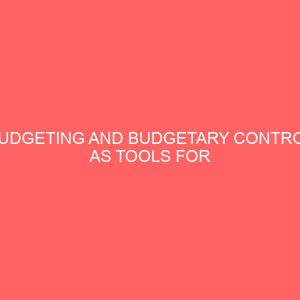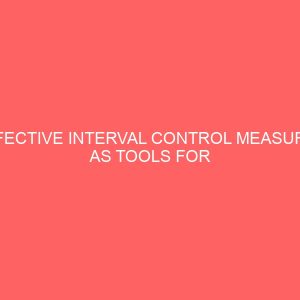WE CAN GET ANY MATERIAL FOR YOU
Do you want a project Material different from this, Contact us
We can buy from other sites for you
09036857618




ABSTRACT
This research work was focused on investigation on the use of budgeting and budgetary control as tools for accountability in government parastatals. A case study of Enugu State Housing Development Corporation. Budgetary control is a quantitative expression of plane of action prepare in advance of period to which it relate. The organization is face with the problem of lack of budgeting while planning and controlling their activities. The objective of the study is to determine if budgeting and budgetary control affect the quality of services delivery in government parastatals. The research also aims at determining if budgetary control contribute to the improvement of management efficiency and high productivity. Data were collected from primary and secondary source. Secondary source of data were collected from textbooks, periodic articles and journals. Questions were distributed as well as personal interviews with functional and departmental heads were conducted. The sample size of 60 were used and was chosen among the number of department / section using Bowleys proportional allocation formula Data were analyzed using table and simple percentage, hypothesis were tested using chisquare statistics. We discovered among other things that budgeting and budgetary control affect the quality of service delivery in government parastatals. It was also revealed that budgeting and budgetary control contributes to the improvement of management efficiency and high productivity. In line with the above, we recommend among other things that the budget plan and preparation should be a corporate duty of the unit heads with head of department in the corporation, improving legislation, realistic budget target. Adherence in the budgeting provision should be practiced by top management.
CHAPTER ONE
1.0 INTRODUCTION
1.1 BACKGROUND OF THE STUDY
The efficiency and effectiveness of the operations of a business depends on the control available to management in almost every business organization, there are a number of activities going on at the same time such as producing, purchasing, distributing, selling and financing a product. These are interrelated in such a way that they affect the attainment of the organization goals.
The institution of cost and management accountant ICMA defined budget as a financial or quantitative statement prepared and approved prior to defined period of time of the policy to be pursed during the period for the purpose of attaining a given objectives. It may include income, expenditure and the employment capital.
Therefore in order to achieve these objectives or goals, the organization must economize resources and discover the means of achieving these goals. These goals can only be realized when the property planned use of available resource are controlled and coordinated effectively. Thus a system of managing a business by making forecast of the different activities and applying a financial to each forecast becomes imperative. These forecastare guided by the information and adoption of planned system such as techniques in budgeting , variance analysis. Etc.
Pandy 2008 defines budgeting control as the establishment of departmental budget relating the responsibilities of the executive to the requirement of a policy, and the continuous comparison of actual budgeted result either to secure by individual actions. The objective of that policy is to provide a firm basis for its revision.
A budgetary control is described by lucey, 2002 as a quantitative expression of a plan of action prepared in advance of the period to which it relates. Budget may be prepared for the business as a whole, fordepartments, for functions such as sales and production, or for financial and resources items such as cash, capital expenditure, manpower, purchase. Etc. the process of preparing and agreeing budgets is a means of translating the overall objectives of the organization into detailed, feasible plans of action. It is therefore, germane to say that the level of importance that is attached in this plan and effort made in controlling the finance differ in organizations. Once the goals are set, which must be based on the detailed analysis of feasibility within the content of the political and social value the plans will enable it to strive towards its attachment.
1.2 STATEMENT OF THE PROBLEM
The growth of the business hinges, or better put, rests squarely units budgetary control system or techniques hence they are considered as a vital tools in any business situation. This study then is aimed at assessing and evaluating the event to which budgetary control has been a tool for the growth and global realization of any organization.
Lack of budgets in planning and control has required in the indiscriminate use of fund meant for more viable activities. Again the inability of many companies to plan and accomplished budget goals is traceable to their inability to apply controls in their budget system.
Budgetary goals are not realized due to low level of understanding of the budget system by middle and low level of management staff. Other problems are shortage of stocks and shut down. These and many more are some of the problem of lack of budgeting control.
₦3,200.00 ₦3,000.00
Do you want a project Material different from this, Contact us
Reviews
There are no reviews yet.